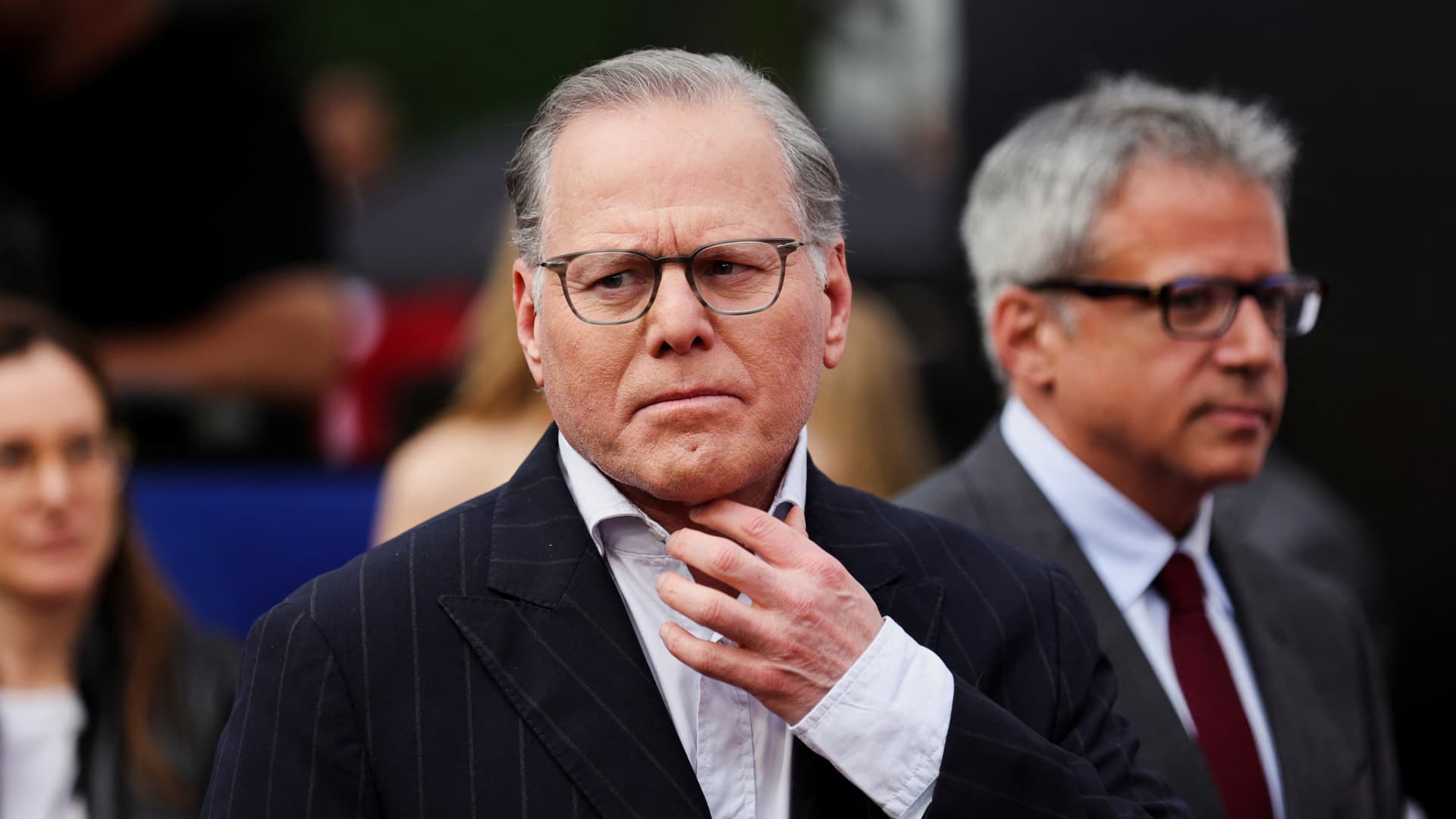David Zaslav attends the world premiere of “The Flash”, in Hollywood, Los Angeles, California, U.S., June 12, 2023.
Mike Blake | Reuters
Warner Bros. Discovery CEO David Zaslav needs a win. Soon.
Since merging Discovery with WarnerMedia in 2022 and immediately slashing billions in costs, Zaslav has struggled to convince shareholders that his company is a worthy investment.
Warner Bros. Discovery shares have fallen about 70% since April 8, 2022, the day the merger closed. His tenure has been defined by implementing thousands of layoffs, cutting movies and TV series for tax efficiencies, killing off CNN+ a month after its launch, hiring and firing CNN CEO Chris Licht, getting heckled at Boston University’s commencement by students chanting “pay your writers” during last year’s writers’ strike, and suing the NBA after the league chose not to renew media rights with his company following nearly 40 years in business together.
Making matters worse for him, Zaslav has long been one of the highest paid CEOs in the country. His 2023 compensation rose 26.5% to almost $50 million. Zaslav’s bonus is tied to increasing free cash flow and reducing debt, a mandate driven by John Malone, the media mogul and influential board member who has championed Zaslav, first at Discovery and now at Warner Bros. Discovery, which has a market capitalization of about $17 billion and $37.8 billion in debt.
The stock dropped roughly 9% in trading Thursday. The company took a whopping $9.1 billion impairment charge Wednesday given the loss of value in its linear cable networks â which still accounts for more than 100% of the company’s adjusted EBITDA. That means the rest of the company lost money.
Warner Bros. Discovery blamed “the continued softness in the U.S. linear advertising market and uncertainty related to affiliate and sports rights renewals, including the NBA” for the size of the write-down.
That’s not music to investors’ ears.
Part of the argument for why Discovery merged with WarnerMedia was that its diversified suite of content would be a “wonderful partner to advertisers,” as Zaslav said when the deal was initially announced in 2021.
Injecting uncertainty into the company’s valuation because of a loss of NBA rights also rings hollow given Zaslav’s claim in November 2022 that “we don’t have to have the NBA.”
“The write-down signifies that this company clearly overpaid for the linear assets as part of the WarnerMedia merger and, given the growing pressures on the linear ecosystem, it also raises a question on what the future cash flows will be on these assets after the potential of losing the NBA,” said Robert Fishman, an analyst at research firm MoffettNathanson.
Nonetheless, Zaslav projected a message of confidence during the company’s earnings conference call Wednesday.
“We feel good about where we are,” Zaslav said. “We have to look at all and consider all options, but the No. 1 priority is to run this company as effectively as possible.”
Fodder for activists
While the company continues to make progress adding streaming subscribers (gaining 3.6 million in the quarter) and moving closer toward sustained profitability, the decline in linear revenue and associated earnings continues to outweigh the growth in its flagship direct-to-consumer service, Max.
Warner Bros. Discovery’s failure to gain traction over the past two years suggests it could be a prime target for an activist investor, who could conceivably push for Zaslav’s ouster or, at the least, ask for the divestment of assets such as CNN or the gaming division.
The company also owns a number of other valuable businesses, including HBO, Warner Bros. studio and DC Comics. LightShed analyst Rich Greenfield has argued it should dramatically scale back its direct-to-consumer aspirations and focus on licensing content to other, larger streamers.
While Zaslav openly discussed seeking partnerships and mergers during Wednesday’s earnings conference call, finance chief Gunnar Wiedenfels brushed away talk of potentially breaking up the company, citing the benefits of “one Warner Bros. Discovery.”
“Every day I’m seeing evidence everywhere in the business of the benefits of those strategies,” Wiedenfels said.
There are two clear hurdles for a potential activist. The first is Malone’s influence over the board. It’s possible an activist fund may be scared away from angling for board seats if it thinks Malone’s power is so great that any suggestions will be rendered pointless.
The second is that Warner Bros. Discovery is arguably already pursuing the correct strategy given the company’s enormous debt load compared to its market valuation. If Zaslav is also looking for buyers for Warner Bros. Discovery, an activist’s pitch to sell the company may not be additive.
Warner Bros. Discovery generated more than $6 billion in free cash flow last year, buoyed by a drastic drop in content spending from the writers’ and actors’ strikes. That number will drop to about $4 billion this year as Hollywood has gotten back to work, according to MoffettNathanson.
Investors will surely want to know how losing the NBA will impact free cash flow in future years, assuming Warner’s lawsuit doesn’t net the company a package of games. But it’s possible that Malone and Zaslav’s strategy of focusing on streaming profitability and costs cuts will eventually pay off.
Still, it seems clear the pressure on Zaslav to show that he can deliver value is mounting. Looking at its competitors, Disney’s media properties appear on the upswing after several years of pain, and Paramount Global has pulled the rip cord and agreed to a merger with Skydance Media.
Part of why Zaslav fired CNN’s Licht last year is the narrative around him turned too toxic.
Now Zaslav in danger of falling into the same trap.
â CNBC’s Rohan Goswami contributed to this article.
WATCH: Tom Rogers on Disney and Warner Bros. Discovery

